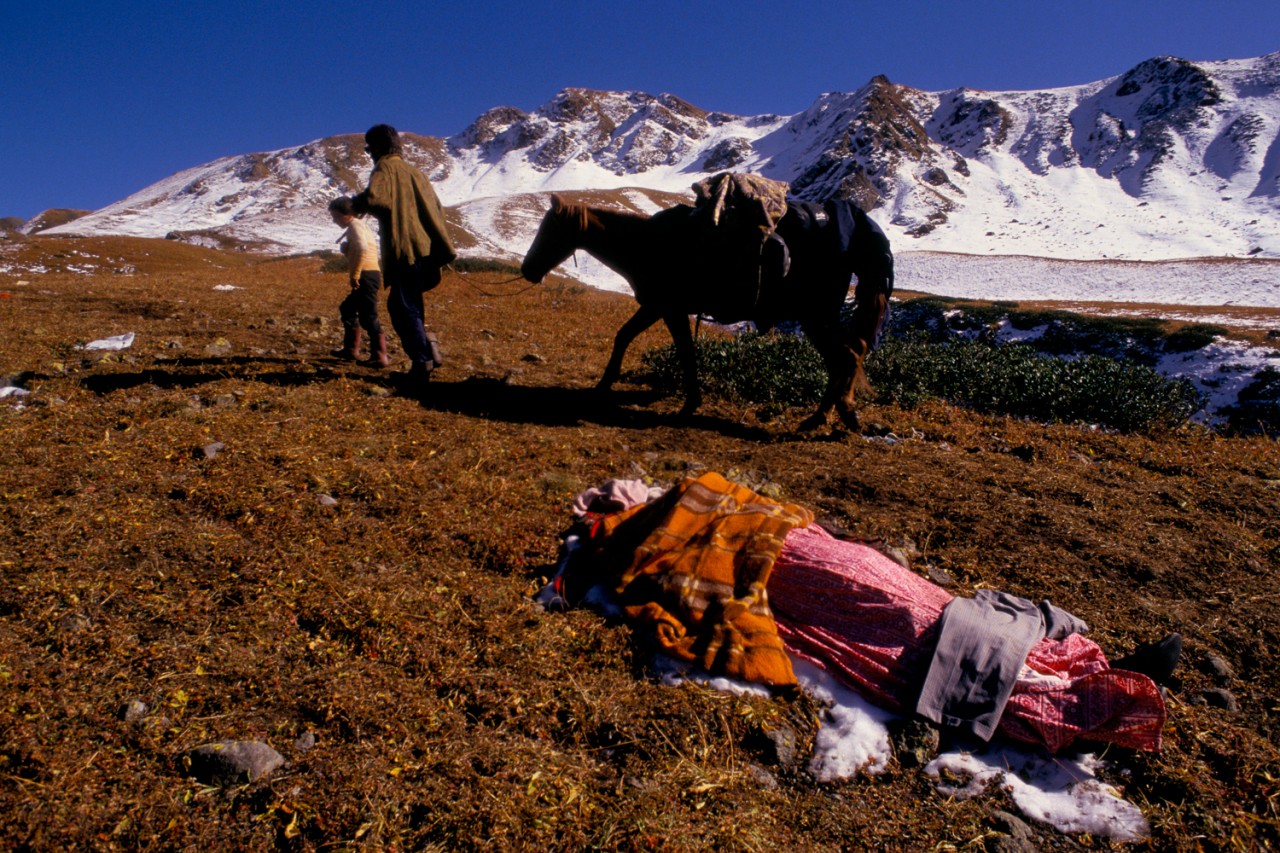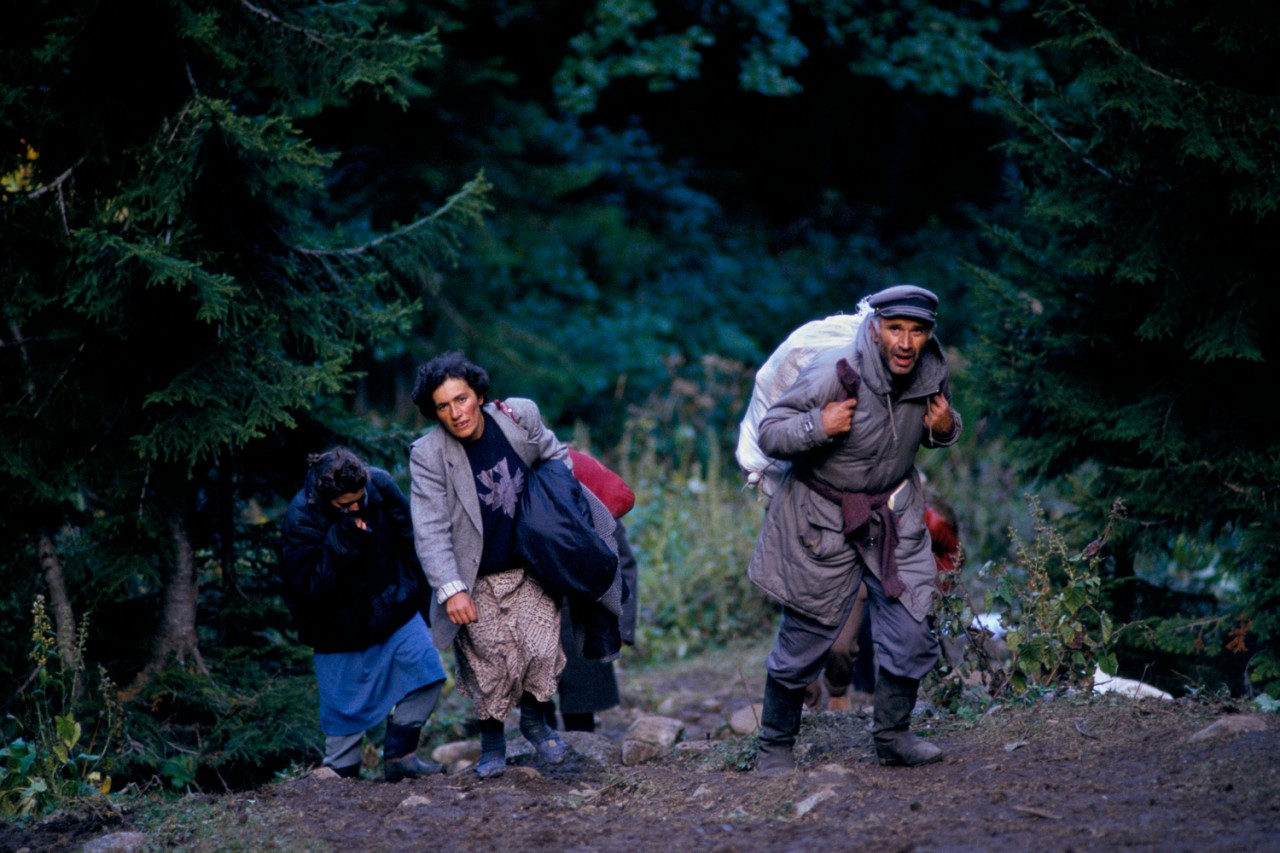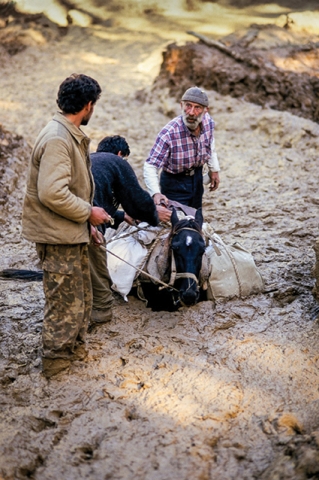Mike Goldwater on the Day Georgia “Lost” Abkhazia, Part 2
Exclusive Interview
Zugdidi bridge was but a starting point of the “mass exodus,” as Goldwater calls it. Most of the refugees had to then embark on a several-day walk over the Chuberi Pass to come over to Georgia proper – a torturous journey under the most difficult of circumstances that ended up claiming hundreds of lives. A friendly govt press officer invited him and two other photographers to fly over to the Chuberi Pass on a tiny aircraft full of bread. “Never seen so much bread in one place before – we had to put some on our knees to sit” – he recalls. They landed at the other end of the Chuberi pass, with people flocking to the helicopter. The job was cut out for him, it was all there –the people, the commotion, all the colors for a palette of his choice – all he had to do was to take a few photos and call it a day. But theirs was an inspired bunch and they had other ideas.
“So we were told that the plane which has delivered the bread was leaving. We had a choice to stay, which would mean walking over the Pass together with everybody else, or getting on the plane and leaving for Tbilisi. We thought – this is the real story, the real deal – so we stayed. The press-officer stayed, too. Funnily enough, I had an inkling we would end up doing just that, so the day before the trip I went over to the airport and bought a bunchload of Mars bars and chocolate biscuits. It turned out to be a rather wise decision: those Mars bars and biscuits ended up being our only nutrition supply as we crossed Chuberi.
“Nightfall. It was cold, people were lighting fires, camping in abandoned cars and huts and such. I had a torch and I was helping myself to make some sort of bed out of branches, when a Georgian soldier came up to me and said: I need your torch! I was none too pleased. So he tells me, ‘I’ll give you my Kalashnikov to be safe!’, trades my torch for his gun and an hour later comes back and swaps again.
“Early next morning, we joined the crowd going over the Pass. It was steep, with a track over that seemed to be part of the riverbed. Due to the melting snow and rain, this track has turned into a massive mudbath, unlike anything I’ve seen before. All the big Russian trucks, cars, even tanks got struck. So everybody, children and elderly included, had to go on foot. I have a picture with two men hauling and trying to get a horse out of the mud – and the mud is literally up to the horse’s belly.
It starts to snow as we head up. And through the tree lines, you could see the bodies of those unfortunate souls who were caught in a blizzard just a couple of days prior and couldn’t make it through alive, covered with bits of blanket and other cloth…”

Refugees walk with their pack horse past the body of a women as they flee over the Chuberi Pass into Georgia. Photo by Mike Goldwater
He pauses, reminiscing and we ask how protected were the refugees – not from nature or predators, but from their own kind. There are still some dark tales roaming about the Chuberi Pass and the refugees’ journey over it – tales of banditry, marauding and manslaughter. Has he seen any of it?
The answer is a firm yes.
“Once we were over the other side, we were suddenly told to stop. We had heard gunfire. And then soldiers come towards us, carrying someone on a stretcher, a Georgian soldier. Bandits had held up the soldiers and demanded they lay down their weapons. The soldier has refused and they’d shot him in the stomach. Obviously, there was some lawlessness going on – but this was a war, right? That was to be expected. During times of war, some people do good things and some do atrocious things. There was this camaraderie and people helping each other out, sure, and then there were criminals, doing what they do.”

Refugees carrying possessions on their backs begin the long climb over the 2,780 metre high Chuberi Pass, fleeing from Abkhazian Svaneti into Georgia. Photo by Mike Goldwater
SHEVARDNADZE
Gamsakhurdia wasn’t the only President Goldwater took a photo of back then.
“Shevardnadze was a very experienced politician,” Goldwater tells us. “Over the years, he amassed phenomenal political acumen and experience. Whether he used that for the good of the country is for Georgians to judge. But he certainly had a presence – he came across as a wise man. I found myself on a plane with him as he was flying over to Moscow for peace negotiations. I remember he didn’t have a visa so we had to go straight to the embassy… Incidentally, on that plane, one of his bodyguards got completely drunk over a bottle of vodka and I remember Shevardnadze being exasperated, as even people in his own team didn’t seem to see the significance of what they were about to do, that it was a pivotal moment for their nation’s history and future. But to give credit, Shevardnadze held his own and didn’t let it faze him that much. After all, he had bigger things to worry about than one bodyguard going down. But it was a rather sad moment”.
LOOKING BACK
Abkhazia wasn’t the only conflict Goldwater filmed – he went on to portray several crises in Africa, and in fairness, they might well have been deadlier. So, after all those years, him being already a veteran of the craft, has his perspective on his very first conflict gig changed? What really happened in Abkhazia? This seems to be a question that he himself has pondered over the years, as he switches from dreamy reminiscing to a somewhat more official, “did my honors” tone:
“It was a privilege to be there. I felt very warm towards Georgia and Georgians. And I really connected to the tragedy that unfolded. So sad to record what happened, but that’s what war is about and that’s what I do. As for what happened… If we look back to the fall of Soviet Union… Russia lost an empire and ever since then, has been chipping away at other countries to regain that empire. The way I see it, Abkhazia was just one unfortunate piece of that jigsaw. Now and again, I listen to Radio BBC reporting on Abkhazia, how happy or unhappy people are there, and so on… You know, it’s very sad, but it’s very much a client state now of Russia. I can’t claim to be an expert, but from what I saw, the people living in Ochamchire didn’t want to leave, they were very happy there. The war – I don’t believe the war was started by Georgia.”
THE FUTURE
There is a question looming: what does the future hold for these two People? The man who has seen it all, at least as much as can be expected from an impartial third party, seems like a good fit to answer that question.
“Everybody wants peace. Except for the few who prefer saber-rattling. They want to create conflicts for their interests, for their political gain. That’s why we have so many areas of turmoil in today’s world. Most people want to get on with their lives, forget and forgive, and couldn’t want anything less than war. It’s the same for Georgia and Abkhazia, I believe.”
Wrapping up, we ask whether he’s been in Georgia since. Turns out he hasn’t. “I plan every year. I’d very much like to go there again. Next year I probably will.”
By Vazha Tavberidze
Main photo:
Related story
Mike Goldwater on the Day Georgia “Lost” Abkhazia












